Why Is the White Man Such an Easy Touch?
Jared Taylor, American Renaissance, September 29, 2023
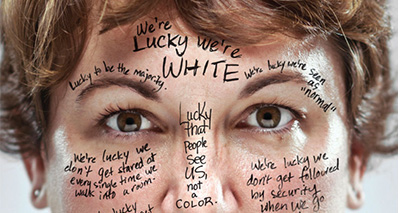
Subscribe to future audio versions of AmRen articles here.
This article is adapted from a speech Jared Taylor gave to an activist group in September 2023.
I’ll start with a story I once heard about William Pierce, the founder of the National Alliance. Years ago, he gave a talk to a group of “normies” about the importance of racial consciousness. He got resistance to his ideas, and he countered with what he thought was a crushing, decisive argument. He said that if America kept blundering down its current path, whites would go extinct. The response was: “Who cares?”
Pierce was thunderstruck. He wasn’t prepared for whites who seemed not to care about their own survival.
Pierce was right to be thunderstruck. Tribal loyalties are part of human nature. History is the story of contending tribes that care more about their survival than about anything else. Humans are so tribal, we even build strong attachments to groups that have no meaning. The students at the University of Louisville and the University of Kentucky are essentially indistinguishable from each other, and yet there is a ferocious athletic rivalry between the two schools. At game time, people who could easily have gone to either school become warring tribes.
In Britain, soccer fans are famous for physically attacking supporters of the other team/tribe. Cities and companies have rivalries. The Olympics and the World Cup are orgies of national/tribal loyalty.
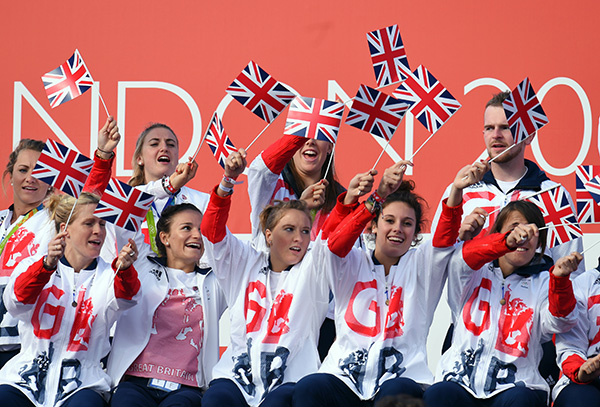
Team GB athletes wave flags at Trafalgar Square during the Olympic and Paralympic athletes heroes’ return in London. (Credit Image: © Dominic Lipinski/PA Wire)
Most people instinctively take their own side. Moroccans don’t have to be taught to root for the Moroccan team. But when it comes to race, whites are the perfect example of the poet Robert Frost’s definition of a liberal: someone who can’t take his own side in an argument. A man can be a Packers fan, a Green Bay city booster, a proud American, a loyal Rotarian, and even a member of the Sons of Norway, but show no loyalty to the white race.
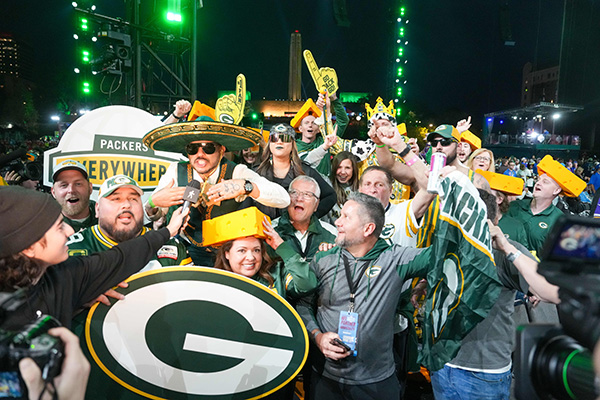
Credit Image: © Max Siker/Image of Sports/Newscom via ZUMA Press
We are unique. People of other races take racial loyalty for granted. It may be that this instinct is not as strong in us as in other races, but it is surely there, even if it has been smothered beneath years of anti-racist propaganda.
With your indulgence, I will play Sigmund Freud. As you recall, that old fraud never did any psychological research at all. He just looked into his own mind and “discovered” the id, the ego, the superego, the Oedipus complex, the Electra complex, and much other craziness. He then announced that what he found was universal.
I will now do something similar. Let me take you back to 1960, into the mind of eight-year-old Jared Taylor, where I will look for something universal. Some of you know that I grew up in Japan, where my parents were missionaries. They were liberals — early integrationists — who believed that all people of every race were children of God. I had never met a Negro, as we called them in those days, and probably had never had a single thought about Negroes.
Well, on June 20th, the black American Floyd Patterson knocked out the Swede Ingemar Johansson to win the world heavyweight boxing title. There was a picture in the newspaper: Johansson flat on the canvas; Patterson standing over him. I didn’t know much about boxing but I knew you didn’t win by taking a nap in the ring. I was flabbergasted. I was 100 percent for Johansson, even though he was a Swede and Patterson was an American. I didn’t care about the American; I wanted the white man to win. I don’t think I cared, especially, that Patterson was black. I would have rooted for Johansson against a Turk or a Guatemalan.
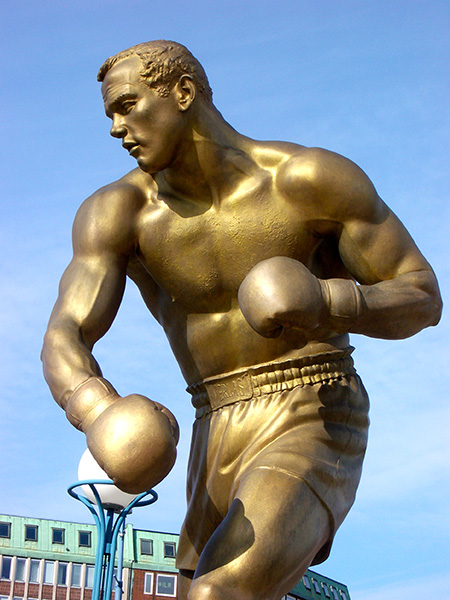
“Ingo the Champ” statue in Gothenburg, Sweden. Credit: Hesekiel, CC BY-SA 3.0, via Wikimedia Commons
I remember asking my father whether there weren’t any of “our” guys — white people — who could knock out Patterson. Dad said no, Patterson was the best boxer in the world. He didn’t seem to be bothered. But I was. It was just plain wrong that the top boxer wasn’t one of “our” guys. I had a natural, instinctive racial consciousness.
I went on to absorb my consistently liberal environment, through high school, college, and into my 30s. During that time, I don’t think I thought even once about the Patterson-Johansson fight. I believe I had forced that memory — which would have been embarrassing — completely out of my mind. It was only in my 30s, after I had arrived at a dissident understanding of race that I remembered rooting for the white man. If I had stayed a liberal, I think I might never have remembered that early flash of racial loyalty. And, today, I would say that was a flash of something universal; years of anti-racist propaganda had smothered it.
Why did it take so long to see the light? In retrospect, I liked being a liberal egalitarian. I liked thinking that I was not just right, but morally superior to “conservatives” and especially to “racists,” whom I assumed were selfish and mean-spirited — not that I knew any, of course. This is an important part of liberalism.
Ten years ago, I read an eye-opening book called Pathological Altruism. It is full of insights, but one of the most memorable was about righteous indignation. Apparently, the feelings of moral superiority and ecstatic self-righteousness stimulate the same part of the brain as addictive drugs: the nucleus accumbens within the basal ganglia. It seems that people can become addicted to the feeling of moral superiority to the point that their brains are hijacked and rewired, just as with drugs. The craving for righteousness becomes so powerful that it short-circuits the reality-testing mechanism of the prefrontal cortex, making addicts impervious to facts. That sounds like today’s “woke” fanatics, doesn’t it? I had to kick a mild form of addiction.

I wonder if white people aren’t, by nature, more susceptible to this kind of addiction. Please recall Frost’s definition of a liberal. Not to take one’s own side in an argument can seem like an exquisite form of generosity — of noble fair-mindedness — so long as the personal costs aren’t high. This is what we see with liberals, who fight like tigers for handout programs that spend government money — not theirs — and for policies such as integration or open borders, from which they can escape to their expensive white neighborhoods.
Please recall that white people all around the world ganged up on Rhodesians and South Africans — and white Southerners in an earlier era — and badgered them into giving up systems that preserved civilization. And felt wonderful about it. Can we imagine Chinese or Indians from all around the world ganging up on China or India, demanding that they end long-standing policies? No. This is what white people do.
And within their own societies, whites make every excuse for non-whites, accommodate them to the point of absurdity, and are prepared to give away their birthright to strangers who often despise them.
I associate this kind of misguided “generosity” — pathological altruism — with what are the hallmarks of Western Civilization: the rule of law, free speech, monogamy, chivalry, and more recently, one-man-one-vote and environmentalism. All these things grew up in the West. Among non-whites, they are imitations with shallow roots.
What do they have in common? A recognition that the rights of others are — at least theoretically — just as important as our own. The rule of law means that I may be the richest, toughest, most powerful brute in the village, but I have to follow the same rules as everyone else. The rights of the weak are — theoretically — as important as the rights of the strong. Free speech and universal suffrage come from the same principle. I can’t shut you up even if you insult me, and I’m not supposed to have any more power at the ballot box than anyone else.
Monogamy is almost exclusively European; even kings are supposed to get only one woman. Everywhere else, the big man gets all the women he can support. Europeans recognized that other men need wives, too.
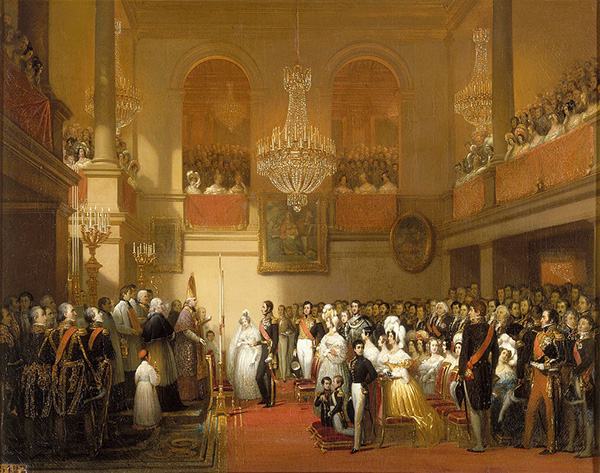
Wedding of Leopold I of Belgium and Louise of Orléans.
Chivalry is exclusively European. Everywhere else, women are sex slaves and beasts of burden. No other society ever put women on a pedestal. Europeans recognized that women — whom men can dominate, rape, kill with their bare hands — deserve not just protection but even adoration.
Europeans traditionally make war with a kind of chivalry; killing prisoners and non-combatants is taboo. Even people who were just trying to kill you have rights. This is not universal. Every historical account agrees that American Indians killed or abducted women and children, and tortured captured warriors to death. Often, they left it to women to invent the most painful and lingering ways to do it. During the French and Indian War, both the French and the British tried — usually unsuccessfully — to persuade Indian allies to fight by European rules.
In War Before Civilization, Lawrence Keely writes that outside of Europe, “surrender was not a practical option . . . because survival after capture was unthinkable.” He adds:
The reason for this no-prisoners policy was seldom articulated . . . . In many cases it was simply tradition, a practice so common and universal that it needed no explanation. For example, during the Zulu War, a British officer asked some Zulu prisoners why he should not kill them, as Zulus always killed British that fell into their hands. One prisoner answered, “There is a very good reason that you should not kill us. We kill you because it is the custom of Black men, but it isn’t the White men’s custom.” Impressed by this appeal to the power of custom, the officer spared the Zulu prisoners. (page 84.)
Good sportsmanship is like chivalric war. The victor does not gloat; he respects his opponent. “Trash talk,” swaggering, and back flips in the endzone are corruptions blacks have introduced — and which some whites have copied.
What is environmentalism but a concern for people not yet born and for species with which we share the planet? It started with white people, and everyone has come along reluctantly, if at all. We want to save the whales; the Japanese want to eat them. We jabber about greenhouse gases while the Chinese keep burning coal. As for protecting other species, Chinese will tell you that “the only thing with four legs we don’t eat is the dining room table.”
All these aspects of Western Civilization reflect a kind of generosity, a realization that life is not always “me first.” These practices are the result of centuries of conflict and trial and error. They are by no means universal even among us, but they began with us and are part of our nature.
Among fellow Europeans, they are good things. They are the basis of trust. Europeans could build complex and uniquely successful societies because we could trust strangers. Unlike societies based on clans and tribes, we could assume that most people played by the same rules of reciprocal honorable behavior.
Years ago, I visited a former teacher, in central Massachusetts. He bought milk directly from a small dairy. The dairyman had a shed by the side of road, where he left a refrigerator stocked with milk. Customers left money in a cup — not even a locked box — and took milk. That’s possible only in a high-trust society. And it’s efficient. The dairyman and his family didn’t have to be there. I’m sure that system is long gone.
I once visited a friend in rural Nebraska. He told me that no one ever locked the door to his house. In fact, it was unneighborly to lock the door; someone might get caught in a storm and have to take shelter.
When I lived in New York, a visitor from Brazil marveled at self-service newspaper vending machines. You would put a quarter in the slot, and that would unlock the door to a full stack of papers. Take one and close the door. The Brazilian said that would never work back home; people would put in a quarter and take all the papers. I wanted to know why; you need only one paper. He said it was almost a matter of principle. Some people might give papers to their friends, but part of it was the impulse to take more than you paid for if you can get away with it.
There is another white trait that makes us an easy touch: An unwillingness to give offense, even when it’s necessary. Not very long after I began to understand race, a friend who was more thoughtful than I told me something I never forgot. He said that a nicely dressed black lady had come by his house one day and said she was thinking of buying a house in the neighborhood and wanted to know what the white residents would think. My friend told her that most whites would say it was fine, but they didn’t really want her. He said that if she moved in, he would do her no harm, but he would treat her with icy indifference. She did not move in. I remember thinking how harsh my friend had been, how hard it would have been for me to speak to her in that way, but my friend was right: Whites must defend what they have. They must be able to overcome their resistance to giving offense and say — about their clubs, their neighborhoods, their nations — “This is for us and not for you.”
My ancestors have been Southerners for generations. My grandparents — born around 1900 — certainly understood the limitations of blacks, but it was rude — bad manners — to talk about them. And that, I believe, is why when Southerners opposed integration, they made silly arguments about states’ rights, not the futility of expecting blacks to act like whites.
When school segregation was threatened by the Supreme Court in Brown v Board of Education, Southerners defended their way of life strictly on Constitutional grounds rather than talk about race differences. Legally, they were right: The 14th Amendment, which the NAACP claimed forbade segregation, did no such thing. Thurgood Marshall made a sociological case about “harms and benefits,” claiming that segregation hurt the feelings of blacks. This was not even a legal argument, and his “sociological” data were dishonest, but in one of the most blatant cases of Supreme Court back-channel malfeasance, the Court unanimously ruled that school segregation was illegal.
It was only after this surprise ruling that desperate Southerners made race-based arguments against integration in the now forgotten cases of Stell v. Savannah and Evers v. Jackson (1963 and 1964). The best race scientists of the day — also mostly forgotten — built an overwhelming scientific case based on studies of average IQ and the ability to plan ahead. The NAACP made no attempt to refute the evidence. This time, its case was strictly legal: The Supreme Court had already ruled, so facts were irrelevant.
The presiding judges were completely persuaded by the scientific arguments. Judge Sidney Mize in the Evers case wrote that the evidence that had been presented to the Supreme Court in Brown was “unworthy of belief” — a “misleading concealment” of the truth — and that “the facts . . . ‘cry out’ for a reappraisal and complete reconsideration” of the case. The Supreme Court refused to hear an appeal and that, so far as I know, was the last time race science was argued before a court for the purpose of setting policy. (William Shockley’s 1984 defamation case against The Atlanta Constitution touched on race, but not in a systematic way.)
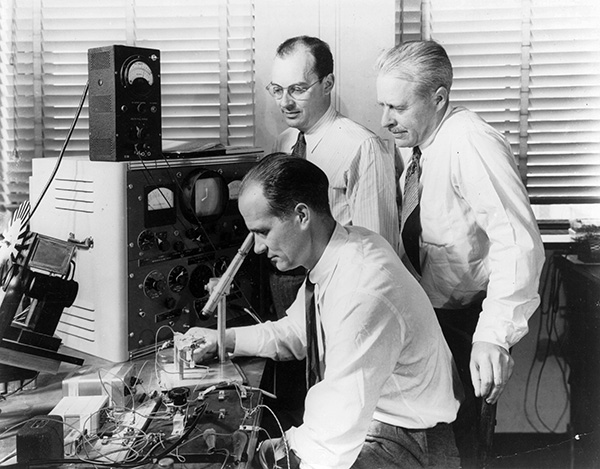
January 1, 1948: Nobel Prize Winners Drs William Shockley (seated), John Bardeen (left) and Walter H Brattain, at Bell Telephone Laboratories in 1948 with the apparatus used in the first investigations that led to to the invention of the transistor. (Credit Image: © Imago via ZUMA Press)
Even when their nations’ futures are on the line, whites cannot bring themselves to speak harshly about others. In 1965, the white minority government of the British colony of Rhodesia unilaterally declared independence and set off years of international condemnation and black insurgency. In 1977, Prime Minister Ian Smith came to the United States to ask Henry Kissinger for help in putting down the insurgency. Smith also visited the Washington Times, where my friend Sam Francis was working as an editorial writer. Francis told me that, just as he had with Kissinger, Smith asked for help keeping the white regime in power because his opponents were communists, not because it would be a disaster to turn the country over to low-IQ blacks. Francis was dismayed that Smith never brought up the already overwhelming evidence for the genetic contribution to black/white IQ differences. Francis speculated that Smith must have thought such a conversation would be bad manners.
Likewise, in 1994, when South African whites voted in a referendum to turn their country over to the African National Congress (ANC), I can find no record that supporters of the “No” vote ever raised the question of black IQ. Why did they not bring in scholars such as Arthur Jensen, Richard Herrnstein, and Linda Gottfredson to explain the scientific basis for something that most South African whites must have understood from experience? The racial argument — powerfully buttressed with data — should have been central to South Africa’s explanation to the entire world of why whites had to remain in power. I don’t think it is an exaggeration to say that good manners — consideration for the feelings of others — helped destroy Rhodesia and South Africa.
I remember attending a conference with the great psychologist Richard Lynn, in which there was a discussion of the unwillingness of whites to defend themselves. “We may be,” he said, “the first people to be defeated because we were just too nice.”
Let us imagine a visibly identifiable minority living among blacks that was as disagreeable and violent a drain on their society as blacks are on ours. It would be impossible to snooker blacks into thinking that it was somehow their fault. There would be harsh repression. Likewise, no race but whites lets blacks manipulate them into thinking they are, collectively, anything but a torment. Chinese are unmoved by accusations of “racism.” In a typically silly but not wholly inaccurate article on the most anti-black countries in the world, the top offenders were India, China, Jordan, Israel, Korea, Russia, Saudi Arabia, Lebanon, and Thailand. Another listing of “racist” countries included Sri Lanka, El Salvador, United Arab Emirates, Myanmar (Burma), Iran, Qatar, and Serbia. These nations can take their own side in an argument; they look out for their own people.
Only white countries pay any attention to demands for reparations for slavery. Muslims took vastly more slaves from Africa than whites did, but why are there no black populations in the Middle East? Owners worked the men to death or castrated them. Muslims took black concubines but killed mulatto children. In Arabic, the word “abd” means both “black” and “slave.” Black con artists know very well they will get nowhere with Muslims.
In the United States, if even blacks can take advantage of whites’ generosity and altruism, how much easier must it be for clever people from India, the Middle East, and Asia? They routinely peddle allegations of “racism” and the mythical benefits of “diversity” to get ahead.
The gullibility of whites seems to know no limits. Only whites could possibly live through months of BLM rioting and believe this was the anguished cry of an oppressed people. Only whites could imagine that police somehow provoke blacks to commit crimes. Only whites — imitating blacks — would say of the people who protect them from black and Hispanic mayhem, “All cops are bastards.” Only whites stop enforcing laws against vagrancy, disorderly conduct, public defecation, shoplifting, fare-beating, littering, etc., because these are “crimes of poverty” that blacks commit more often than whites. And only whites then impassively watch their cities turn into stinking, depraved, crime-plagued tent cities for degenerates.
Europeans follow our example. For decades, there have been headlines like this: “Europeans overwhelmingly against immigration: Poll.” And yet Europe’s rulers and especially the bureaucrats in Brussels ignore the popular will and jabber about “humanitarian concerns” and “treaty obligations.”
The French got their first race riot in 1979. Their rulers learned nothing. Immigrants just kept rioting, with especially nasty uprisings every five or six years. This summer, France got 19 days of rioting, with violence in more than 500 cities and villages. There were two dead, 800 officers injured, 6,000 cars burned and more than 1,000 buildings destroyed or damaged. Every New Year’s Eve, despite nationwide warnings and mass mobilization of police, Muslim immigrants go on an orgy of car-burning. If they manage to burn only 1,000, that is considered a success for the authorities.
Arabs don’t belong in France. What could be more obvious? But the only mainstream politician to put it that bluntly is Eric Zemmour, a Jew from North Africa.
In Britain as well, it seems that only a politician of Indian origin, Suella Braverman, dares speak frankly. In a speech this week in the United States, she said that immigration is an “existential” threat to the West, and that governments that cannot control borders will “not endure.” She called the current refugee system “absurd and unsustainable” and said that the UN treaties that started it should be scrapped. Perhaps Mr. Zemmour and Miss Braverman are, by their very natures, more willing to speak bluntly about what must be done to protect societies they have adopted as their own.
Eastern Europe has been better at keeping out Muslims and non-whites, but even there, only Viktor Orbán of Hungary — and even he, only occasionally — says openly that Europe must remain white.
When will whites take their own side in this argument?
A big part of the problem, of course, is leftist media domination. In 2019, I was in Estonia, a nation that has mostly kept immigrants out. I was mesmerized by BBC Television beamed into my hotel room. BBC had just hired its first “LGBT correspondent,” a black man. He cavorted from one degenerate but alluring scene to another, wreathed in smiles, giving off an aura of polished wealth. How long can even Estonia resist constant battering from the rich, glamorous West?
As Gregory Hood notes, we don’t have state-run media; we have a media-run state. Most big media are fluffers for the Democratic Party. National Public Radio gets about a third of its money from the Corporation for Public Broadcasting. That’s tax money. But has even one NPR employee ever voted for Donald Trump?
The power of media explains how homosexuality suddenly became stylish. In 2003, it was still a crime in 14 states when the Supreme Court made it legal everywhere. Just 12 years later, in 2015, the court forced same-sex marriage on the country. This could not have happened if media had opposed these changes rather than clamor for them.
Most people don’t think for themselves. They believe what they hear from prestigious sources. And yet, despite virtual monopoly control of big media, our rulers are terrified of us. If what we say is so awful and wrong, we wouldn’t be able to persuade anyone, would we? But of course, despite one of the most sustained censorship campaigns in history, people keep coming our way because we are right. Once people understand race, they can unravel countless mysteries; things that made no sense suddenly become clear. That is why so few people move from race realism to liberal egalitarianism. Once your eyes are open, it is hard to close them.
Of course, there are not enough of us. Determined minorities can turn societies upside down, but we can’t do that yet. For our ideas to triumph, there must be more of us. Today’s orthodoxy is so absurd that many whites wake up on their own, and we must have a movement ready for them when they are ready for us. But most will not wake up on their own. We must reach them. And that is why the fight for access to the internet and social media is so important. That is why Elon Must has to defy the ADL and make at least one major platform a real home for free speech. If we are so effective despite censorship, imagine what we could do in a free market of ideas.
The purpose of many of our organizations is therefore to preach the gospel, so to speak; to change people’s minds. But we are more than missionaries. We are revolutionaries. We want to set some of the regime’s most sacred principles on their heads and turn American doctrine on race inside out.
However, if I am right about white people — if we are a uniquely fair-minded and generous race that can easily be tricked into pathological altruism — how does that change our message? We must be the most unthreatening, even lovable revolutionaries in the history of revolutions.
No crazy clothes. No funny haircuts. No violent slogans. Our message is for wayward brothers and sisters, for our fellow white people. And to change their minds, we must be people they can like and admire; we must never be people who scare or repel them.
Also, we must always remember that you cannot reach white people by appealing directly to their own interests. That works for everyone else, but not for us. Do blacks care whether it’s fair to tax today’s white people to pay for reparations? Do the Chinese care if we destroy our economies trying to go carbon neutral while they pollute the planet?
White people are different. When we talk to them, we have to emphasize fairness. We have to put the spotlight on the hypocrisy and double standards others use to exploit us. We must show whites what every other group takes for granted but that is denied only to us.
Clearly, the people most likely to listen to us with an open mind are so-called “conservatives,” who have not swallowed the wildest “progressive” positions. However, on race, they are no different from liberals. They are just as unable or unwilling to take their own side. Therefore, an appeal to deluded whites need not distinguish between liberals and conservatives. The same arguments are likely to work as well — or as badly — with anyone. We might as well appeal to all whites as if they were liberals, because most “conservatives” are just as ignorant and terrified. We need allies wherever we can find them.
However, in any approach to whites, we have to do something that is very hard. We have to accept that whites, even liberal whites, are acting in good will. I know a lot of you disagree with me, but I’m right and you’re wrong. Liberals — the overwhelming majority of white liberals — are good people. They truly believe they are on the side of the angels, doing their best to do what is right.
I don’t presume to speak for George Soros or Al Sharpton, but ordinary people who listen to National Public Radio — and I know many — don’t want more crime, they don’t want American schools to fail, they don’t want more people on welfare, and they don’t want white people to go extinct. They are deluded, they are closed-minded, they are stubborn, and they are wrong. But they don’t get up in the morning and say to themselves, “How am I going to torment or discredit white people today.” Joe Biden and Nancy Pelosi don’t do that either.
Think of it this way: Do liberals ever make the slightest attempt to understand us? No. Never. The SPLC and NPR tell them we are scum and they believe it. They are lazy and they take mental shortcuts.
But tell me: Do you ever try to understand white liberals? It takes a lot of work to understand a liberal. It’s a lot easier to take mental shortcuts and think they are scum.
That’s a luxury we can’t afford. We have to understand them if we are going to persuade them. We have to take their professions of good will at face value. It’s hard, but it has to be done.
Yes, we are in a fight for our lives, just like our ancestors at the Battle of Tours and the Siege of Vienna. But our fight is different. Our ancestors had a simple strategy. Kill the enemy or die trying. I wish it were that simple for us. I believe every man in this room would march laughing to his death if that was what it took. That’s not what it takes.
Our job is harder. Our job is not to kill the enemy. We have to convert the enemy, seduce the enemy. And for that we have to meet our white brothers and sisters on their own ground, take them at their word. Understand that they are sincere, that they are part of the great, generous Western tradition of taking the other guy’s rights as seriously as we take our own.
And don’t forget: We have basal ganglia, too. It’s easy to get a thrill when we think the people who disagree with us are evil scum. We can’t afford to become addicted to righteous indignation. That makes us the center of things; that puts our feelings first. It distracts us from the job we have to do.
That means that in order to get our fellow white people to wake up and take their own side in this life-or-death struggle, we have to be more generous, more forgiving, and much more patient than they are. Even when they are insulting and contemptuous.
Think of it this way: Will you listen to someone who thinks you are scum? Will his facts or his arguments persuade you? No. If we are to persuade our people, to open their eyes, they must believe we are not their enemies. We want to save them. We want for them what is good and true. We want them to be like us. And they will never be like us if they think we despise them.
This is the great tragedy of our cause. So many of our most determined opponents are our own people. We must approach them with the hope that somewhere within them is still that spark of racial consciousness that was glowing inside the mind of little eight-year-old Jared Taylor. That spark has been smothered by years of anti-racist insanity, but our job is to find that spark, blow on it gently, patiently, and, yes, lovingly, and turn it into a raging fire.















